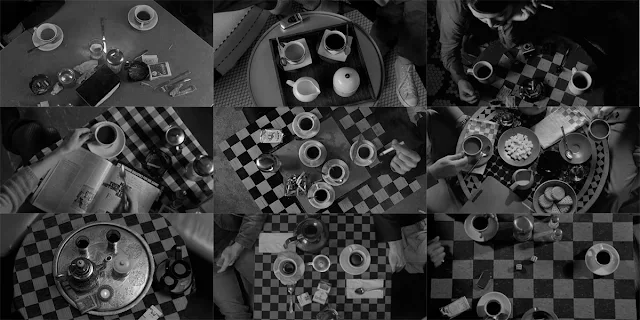Cast: Roberto Benigni, Steven Wright, Joie Lee, Cinqué Lee, Steve Buscemi, Iggy Pop, Tom Waits, Joseph Rigano, Vinny Vella, Vinny Vella Jr., Renee French, E.J. Rodriguez, Alex Descas, Isaach De Bankolé, Cate Blanchett, Michael Hogan, Jack White, Meg White, Alfred Molina, Steve Coogan, Katy Hansz, The GZA, RZA, Bill Murray, William Rice, Taylor Mead
Director: Jim Jarmusch
Screenplay: Jim Jarmusch
Cinematography: Tom DiCillo, Frederick Elmes, Ellen Kuras, Robby Müller
Production design: Dan Bishop, Mark Friedberg, Tom Jarmusch
For Jarmusch fans only. Coffee and Cigarettes, a collection of 11 black-and-white short films in which people sit at tables and drink coffee and smoke cigarettes, began as semi-improvisatory shorts spun off from Jarmusch's features by their crew and cast members and friends. Starting with Roberto Benigni and Steven Wright essentially winging it in "Strange to Meet You," the collection evolved from a series of shaggy-dog sketches into more structured narratives with a few motifs echoing throughout. The most structured is certainly "Cousins," in which Cate Blanchett plays two roles: the soigné movie star Cate and her blowsier cousin Shelly, who resents Cate's privileged life. They meet in the coffee shop of a luxury hotel, where Cate patiently endures Shelly's sniping until she's called away for an interview. Shelly has been smoking throughout their conversation, but when she lights up after Cate leaves, a waiter tells her that smoking is forbidden there. The episode "Cousins?" is a parallel story in which Alfred Molina and Steve Coogan, two British actors trying to make it in the States, meet for coffee, during which Molina reveals to a very unimpressed Coogan that he has done genealogical research which proves they are distant relations. After an excited fan asks for his autograph, Coogan becomes more and more condescending toward Molina. Then Molina receives a call on his cell phone from Spike Jonze, instantly deflating Coogan's ego to the point that Molina leaves him to pay the check. Amusing as these vignettes are, they don't rise much beyond the level of anecdotes, and some of the other episodes, such as the ones in which Jack White demonstrates his Tesla coil or Renee French fends off a too-attentive waiter, fall flat. Still, if you don't expect too much, there's an evanescent charm to the whole project.
Watched on Showtime

